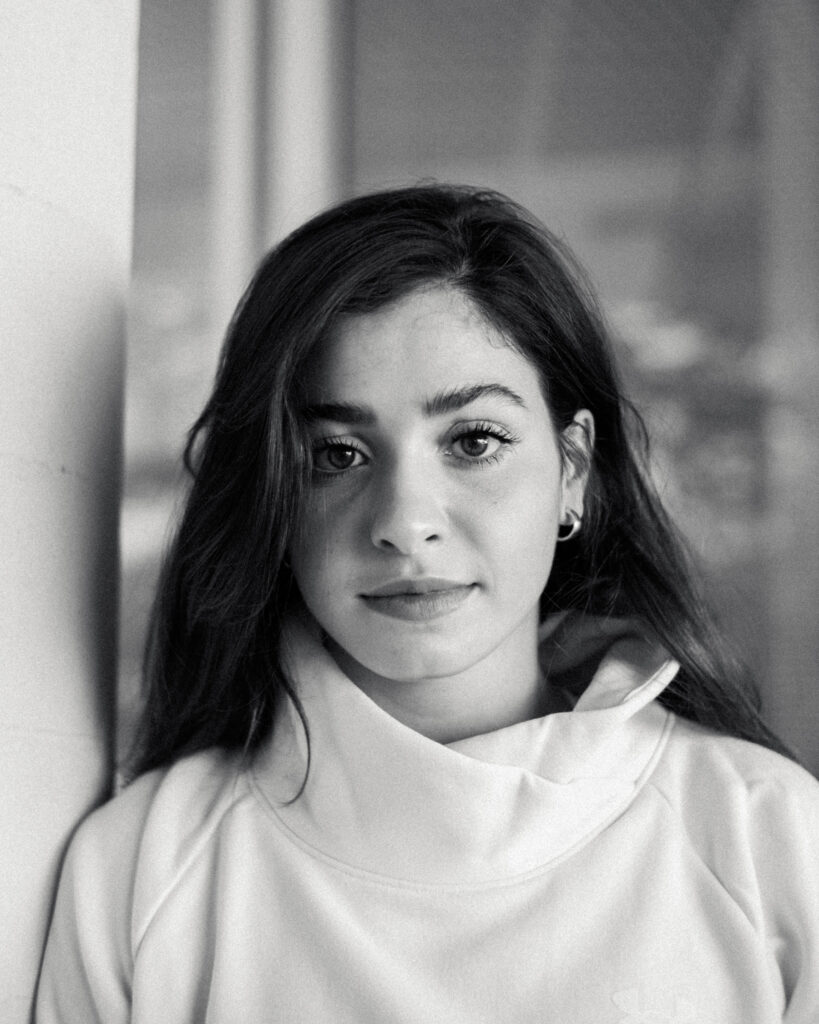Newsfeed

When the boat’s motors failed in the middle of the Mediterranean Sea, the injustice was loud and undeniable. In that moment, Yusra Mardini and her sister Sara, along with 30 other passengers, realised they had been lied to and cheated. Fleeing the war in Syria and seeking refuge, they were heading to Lesvos, Greece, in a boat entirely unfit for the journey – overloaded with passengers far beyond its limit and likely never inspected before departure.
“I thought it would be a real shame if I drowned in the sea because I am a swimmer,” Yusra began, when sitting down with GRAZIA during her recent Dubai visit.
By a fateful turn of events, the Mardini sisters were competitive swimmers in Syria. Recognising the urgency and the stakes, they plunged into the water and swam tirelessly through the night, pushing the boat and its passengers towards safety. “I was in the water, and the only thing I could think about was how the salt was on my neck, my eyes, my face,” she mused. “I was just seeing the island but never, ever getting there.”
Since 2016, over 22,000 migrants have been reported dead or missing on similar journeys, many falling victim to unsafe boats provided by smugglers.
The smugglers’ promises of refuge came at the tragic cost of exploiting lives for money – a stark reminder that moments of desperation have a way of bending the lines of morality. Often, in the shadow of poverty and the relentless fight for survival, decisions aren’t always clear or clean. Unfortunately, these moments of emotional politics often push those already in dire situations into an unforgiving cycle of hardship. Seeking refuge itself has become fraught with peril, reflecting the devastating impact of Syria’s ongoing war and economic collapse.
Yet, Yusra and Sara’s heroic act of saving the passengers was only the beginning. From Lesvos, they travelled through multiple countries – sometimes on foot, sometimes by train – witnessing the hardships of countless others along the way. After weeks of uncertainty, they finally arrived in Berlin. Sara courageously returned to Lesvos to help others facing the same perilous journey they had endured. Her work on the ground – helping refugees navigate their arrival and providing critical support – has made her a well-known advocate and symbol of hope for displaced people.
Yusra had arrived in Berlin with a promise to herself and her parents: she would continue swimming. She resumed training with coach Sven Spannekrebs at the Wasserfreunde Spandau 04 club. Her dedication led to her selection for the inaugural Refugee Olympic Team in 2016, competing in the Rio Olympics and later the 2020 Tokyo Olympics. Beyond her athletic career, Yusra became the youngest-ever UNHCR Goodwill Ambassador in 2017, advocating for refugees worldwide and using her story to challenge stereotypes and inspire empathy.
NEW HORIZONS IN SYRIA

The recent fall of the Assad regime shook the Middle East, sparking hope for a new chapter among Syrians worldwide. For Syrian athletes, many of whom had had to navigate their careers as professional refugee athletes or represent Syria from abroad, this moment feels especially poignant. And for Yusra, it’s an opportunity to reflect on where her journey all began.
“Anyone can become a refugee overnight,” Yusra reflected. It’s a statement that resonates deeply with the millions of displaced people globally and one that reflects the overall message of The Swimmers, a Netflix film that brought their story to life. “When I swam through the ocean to safety, I never thought of a movie being made of my life, because so many other refugees went through the same,” Yusra mused.
The movie earned recognition for clearing the opaque screen on the refugee experience. Monica Castillo of RogerEbert.com described it as “a moving tribute… to the millions of refugees who risked everything to uproot themselves to safety”.
With stability cautiously entering the picture, Syrians are showing their excitement to rebuild their country. As the immense task of re-establishing structure and order begins, one might assume sports would take lower priority amid the chaos of reconstruction. Yet, the sports community has acted quickly.
Just hours after Assad’s fall, the sports federation changed the national team’s jerseys from red to green and posted the update online with the caption: “Our national team’s new outfit. The first historic change in Syrian sports, away from favouritism, nepotism and corruption.”
The newly adopted green flag was sent to FIFA, marking a symbolic break from the past. Plans are already underway to remove any remaining traces of the former president from sport infrastructure. But why such urgency? The answer lies in the systemic corruption and favouritism that defined Syrian sport under the Assad regime, forcing athletes like Yusra to endure countless injustices.
“My father was a renowned coach in Syria, known for training the country’s best swimmers,” she recalled. “When I joined the national team to prepare for competitions and the Olympics, they refused to let me train with him. Despite his track record and expertise, they said no. He’s my dad – I trained with him my whole life, so what’s the big deal if I continue training with him? To them, it wasn’t acceptable to have someone outside their system supporting national athletes, even if he was better. Sometimes, being successful makes you a target. It’s the opposite of the Western world.”
In the sports federation ruled by the regime, decisions often came down to politics and favoritism. For many athletes, unfair rulings were rooted in connections and personal gains for those in power. But knowing this didn’t make it any easier for those directly affected.
“After the World Championships, I was training for the Youth Olympic Games, but the federation told me I wasn’t going because I had already competed in the World Championships,” the 26-year-old explained. “Their reasoning was to ‘give another girl an opportunity’. It was clear it was favouritism or some form of corruption. I waited two years for my chance and eventually proposed a race between me
and the other girl – my friend – but in sports, there’s no friendship. They said no. That same day, I went home and told my dad, ‘I’m done’. I didn’t set foot in a pool for a year.”
Despite calls from the federation president and coaches, Yusra refused to return, disillusioned by the system. That decision, made in favour of the federation’s interests, nearly ended her career. Yusra’s story is not unique. Syria’s only Olympic gold medalist, Ghada Shouaa, also endured systemic corruption and fear under the Assad regime. Despite her monumental achievements for the
country, she faced lies, death threats and financial neglect.
Even after her Olympic victory in 1996, Shouaa was denied her rightful salary. Assad’s family forced her to tell the media that they had met her, paid their respects, and given her what she was owed. If she refused, she faced severe consequences. These pressures followed her for decades, culminating in her removal from Syria’s delegation for the Paris Olympics in 2024.
This atmosphere of fear and control resonates deeply with Yusra’s own experiences. During her advocacy for Syrian and refugee athletes, Yusra, too, was careful to avoid directly challenging the federation – an understandable hesitation given the oppressive dynamics that silenced voices like Shouaa’s.
A DECADE OF DESTRUCTION IN SYRIAN SPORT
“A lot of sports facilities were always targeted because they doubled as army bases, like so many complexes in the Middle East,” Yusra shared.
Sports infrastructure in Syria faced devastation over the past decade. Facilities, including the Aleppo International Stadium, Homs Municipal Stadium, and Abbasiyyin Stadium, were bombed and left heavily damaged or entirely unusable. Athletes had to train in unsafe and inadequate conditions, often without access to basic necessities.
“I just know that it’s been very difficult. Athletes have been swimming in cold water. Sometimes there’s no electricity in the country, no water in general – not even for showers,” she explained. “If sports were tough before the war, imagine what it was like during, and even now, after.”
While some stadiums, like Aleppo International Stadium and Homs Municipal Stadium, are now undergoing renovations, the scars of destruction still hinder the growth of Syria’s sports infrastructure.
In the media, we’ve seen athletes struggling to battle a system – how can you fight a system that doesn’t allow you to speak? But silence breeds frustration and frustration sparks revolution. Syrian athletes today are channelling this into action, determined to reshape a broken system into something fairer and freer. With examples like the national football team’s swift changes, and statements from athletes calling for reform, efforts are gaining momentum. Yusra, through her foundation, envisions bringing her work back to Syria, aspiring to contribute to its rebuilding through sports and community support.
THE YUSRA MARDINI FOUNDATION

“Sports teach you discipline from a young age,” the athlete affirmed. “They give you normality, a schedule, confidence, and friends.”
Sports aren’t just about physical activity – they create purpose, create connections, and open doors. They’re a way to turn chaos into structure and transform idle time into meaningful progress. This is especially critical for countries like Syria, where years of war have left communities in need of more than just food and shelter. While humanitarian aid addresses immediate needs, sports can address the soul – offering hope, unity, and a sense of belonging.
For Yusra, starting her foundation was about giving refugees access to this very power. “The foundation focuses on supporting refugees worldwide with sports lessons and, eventually, education,” the swimmer highlighted. “We haven’t done anything with education yet because it’s a little more complicated in the philanthropic world, but I’m hoping to start soon.”
The Yusra Mardini Foundation has already made a significant impact through its initial projects. In France, the foundation partnered with Oris, a Swiss watch company known for its sustainable practices. Together, they organised swimming lessons for refugees, giving participants a chance to learn essential skills and feel a sense of achievement.
On the island of Lesvos, the foundation held additional swimming lessons for refugees who often lack access to basic resources. These lessons weren’t just about learning to swim; they offered a moment of normalcy in otherwise challenging circumstances.
One of the foundation’s largest initiatives is a resettlement programme run in collaboration with the International Olympic Committee and a university in Canada. This programme provides financial support to refugee athletes, helping them relocate to Canada to continue training and competing. For some, it’s a pathway to fulfilling their ambitions, while others return to refugee camps with a renewed sense of purpose to help their communities.
“These are the three projects we’re currently working on. We’re small, and we’re trying to learn,” she explained. “The next project will likely be about Syria. We don’t usually do emergency projects, but this one will probably involve a foundation on the ground, whether in Lebanon, Jordan, or Syria. We’re still working on it.
“I would love to have a Mardini swimming school. Part of it would be philanthropic – where I get funds from the foundation. A lot of people can’t even pay for swimming lessons, so why not set up something sustainable where kids can come and swim? It’s very important to learn how to swim, in my opinion, to prevent drowning, and so on.”
A STORY SHE’LL CONTINUE TO SHARE
Yusra’s story is not a new one and people often ask her if she ever grows tired of sharing details of the harrowing journey, the refugee camps, the Olympic dream. Her answer is a resolute ‘no’. “Telling the story is important because I can, because I have the spotlight, because people want to listen. That’s rare,” she affirmed.
The world is finding common threads in conflict, connecting across borders through social media and platforms like Snapchat’s Snap Stars. For years, the term ‘refugee’ has often been associated with the West’s response to global crises, while the stories themselves remained rooted in the East. But in recent years, the world has become more attuned to global issues than ever before, thanks to the power of social media.
Yusra’s leveraging of the innovative Snap Stars feature gives her unparalleled access to millions of users worldwide. It’s a brilliant move by the app, granting individuals who represent such meaningful causes a powerful platform to connect with global audiences and, for Yusra, to amplify her message of resilience, hope, and advocacy for refugees.
“It’s not just about my story or my sister’s story – it’s about millions of people and millions still in camps whose voices aren’t heard,” Yusra said.
Her presence on social media is more than just an extension of her advocacy – it’s a vital part of it. As Yusra puts it, “A lot of refugees don’t ever talk about it. They’re scared, thinking, ‘Who’s going to believe me?’” But when they see stories like hers amplified, it inspire others to share their truth. “It made me really proud when people started saying, ‘My story is like hers.’ It’s a responsibility to speak up, not just for myself but for everyone still in camps.”
This responsibility has taken Yusra to refugee camps around the world, from Za’atari in Jordan to Kakuma in Kenya, one of the world’s largest. “It impresses me every time I meet refugees and refugee athletes. They know their responsibility to give back, and they know exactly what they want. Their dreams haven’t ended because of challenges – they’re more motivated to achieve and give back because of them.
“Refugees are dreamers,” Yusra shared. “These kids are so ready to prove who they are.” In a striking contrast to a world where modern children often feel paralysed by endless choices, these kids are laserfocused, ready to achieve their dreams against all odds.
What’s clear about Yusra, though, is her grounded perspective on life and struggles – an outlook shaped by her parents, who she says were her pillars of strength in a society that didn’t always value sport. Their wisdom continues to guide her: “You don’t need to be accepted (as a refugee); you need to be yourself. Being unique is different. In actuality, it’s the disrupters that are admired. Never think differently, and I think that takeaway is fitting for anyone.”
This mindset is a fitting message not only for refugees but for anyone striving to overcome obstacles. As Syria rebuilds, Yusra’s foundation opportunity to thrive, not just survive. With the profound love Syrians hold for their country, there’s every reason to remain hopeful for a brighter future. Her story is far from over, and her impact will undoubtedly resonate for years to come.








